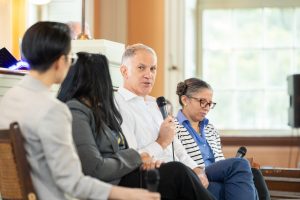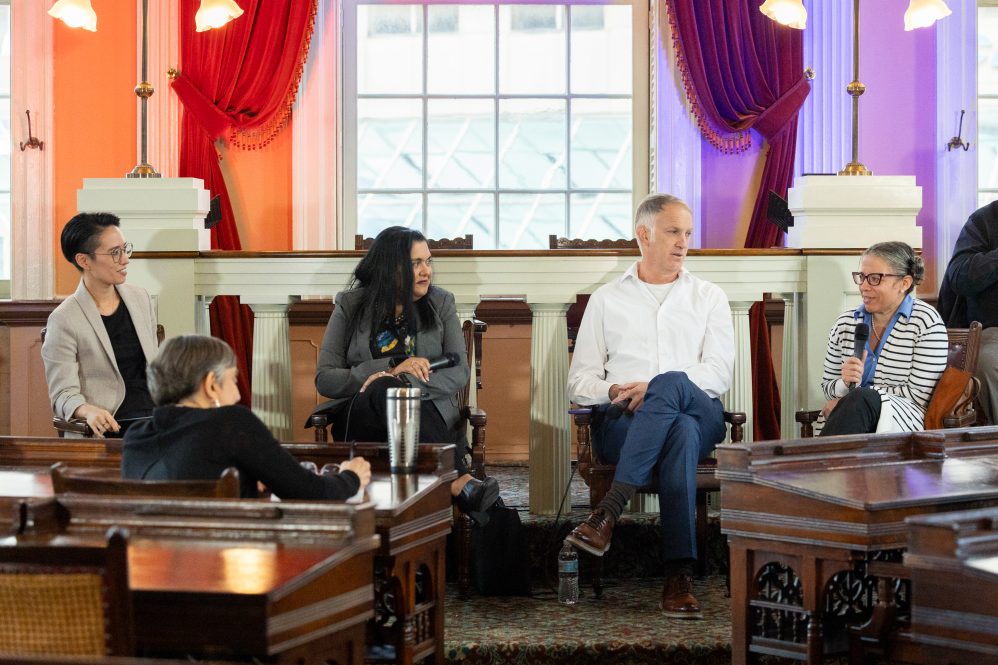It’s rare that any particular event can be confidently predicted to be of major historical significance before it happens, but American presidential elections definitely fit the bill. And while all presidential elections are momentous, each one has unique dynamics and characteristics that influence history in very different ways.
It was with this in mind that three UConn scholars gathered at the Old State House in Hartford on Tuesday, Oct. 8, to analyze the current presidential contest in terms of historical significance – and what makes this election distinct.

One of the most striking differences between this election and every previous presidential campaign is that a major party nominee – Vice President Kamala Harris – is a woman of color. Even more remarkable, the scholars said, is the way she came to win the Democratic Party’s nomination – being endorsed by President Joe Biden after his unprecedented decision to drop out of the race just weeks before the party’s nominating convention in August.
“What I will never forget, especially as a political scientist, is the way she came to be the Democratic nominee,” said Evelyn Simien, professor of Political Science, Director of the Africana Studies Institute, and author of “Historic Firsts: How Symbolic Empowerment Changes U.S. Politics (Oxford University Press, 2016).”
Manisha Sinha, the James L. and Shirley A. Draper Chair in American History and author of “The Slave’s Cause: A History of Abolition (Yale University Press, 2017)” and “The Rise and Fall of the Second American Republic: Reconstruction, 1860-1920 (Liveright, 2024),” agreed that the circumstances of Harris’ nomination make the 2024 election unique.
“This is probably one of the first times we’ve had a presidential nominee so late in the game who has been able to step up so quickly,” she said.
Another distinctive factor of this election, argued Christopher Vials, professor of English and author of “Haunted by Hitler: Liberals, the Left, and the Fight Against Fascism in the United States (University of Massachusetts Press, 2014),” is that “new taboos continue to be broken” in political rhetoric surrounding the race.
Pointing to an interview the pundit Tucker Carlson conducted in September with a far-right podcaster notorious for defending the Third Reich and blaming Winston Churchill for World War II, Vials said, “Tucker Carlson is nodding his head, and then Elon Musk tweets about how that was a fabulous interview. They’re sort of breaking the Hitler taboo now.”
One concern all three scholars shared was the possibility of low voter turnout, especially in states like Connecticut, where the presidential race is not expected to be competitive.
“A lot of people become a little blasé about elections; they think noting changes, they think their vote doesn’t count, and that can open the door to authoritarian outcomes in elections,” Sinha said.
Simien said she reminds her students that the right to vote has only, in historical terms, recently been won by all Americans regardless of race or gender, and shouldn’t be taken for granted.
“Younger voters owe a debt to older generations, people who have sacrificed life and limb so that we can have the right to cast a vote in American elections,” she said.
Vials noted the importance of elections for state and local offices, pointing out that decisions made in city hall or Hartford often have immediate, direct consequences in daily life.
“State elections affect your lives a lot; they determine whether social services are going to be provided, whether universities are going to be funded, tax rates, who gets taxed – those are things that affect people’s lives every day, apart from the federal election,” he said.
Connecticut residents will be able to vote early for the first time this year: balloting begins on October 21 and runs for 14 days.
The forum at the Old State House was sponsored by the UConn Department of Social and Critical Inquiry, Department of English, Africana Studies Institute, Department of History, and Department of Political Science.
A video recording of the discussion can be viewed on YouTube.



